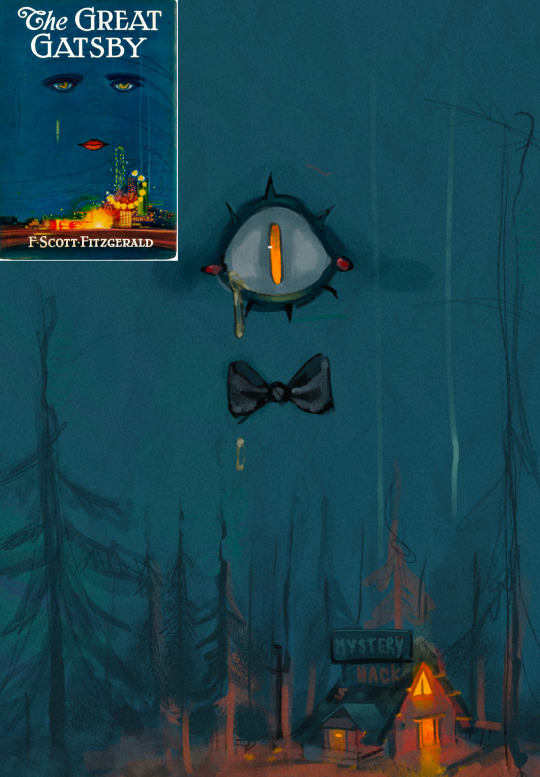devoutvesta
79 posts
Don't wanna be here? Send us removal request.
Text
there could be 100 genders in a room and it wouldn’t fucking matter bc the earth has 8 billion people and confining that many humans all into just 2 identities is unrealistic. science is so important, and the united states government is dumb as hell. no one can tell you who you are, except you
308 notes
·
View notes
Text
currently thinking about the recurring star motif in both bill and ford's stories and all the parallels we can draw from it. ad astra per aspera, from hardship to the stars, a motto that reflects both of their experiences. bill's longing for the stars, to see them and to be one. ford longing to become famous (a star), one of the greats, to make him worthy of admiration rather than something to be feared/repulsed by. 'the stars' are both literally and figuratively something they both reach out for. it's a metaphor for their desire for fame, success, and love. but both of them also, quite literally, adore the stars. ford's favorite constellation to look for in the night sky is bill's. (alternatively, ford's own nephew and niece are the big dipper and the shooting star. he found happiness for the first time in decades through his family. from hardship to the stars.)
the stars are the happy ending that waits for them after their hardship. both of them experienced some sort of long term prejudice for a birth defect, bill's eye and ford's fingers. when bill promises ford unlimited knowledge and power, he imagines ford towering over the multiverse, surrounded by beautiful stars.
(a more painful parallel is how they cope with their 'weirdness', another shared motif. ford hates himself for it, you would too if people ran away from you, screaming and crying. he hides his fingers. tries to overcompensate for the rest of his life. bill, on the other hand, glorifies his own defect. to cope with accidentally destroying his dimension, to avoid feeling the guilt and the self-loathing, he convinces himself that he is a monster, that he did it on purpose. he glorifies his violence, his defect, he's the all seeing, all knowing eye/the beast with just one eye. he does the same to ford, his glorification of ford's birth defect is evident in the way he calls him 'sixer', or how he seems to consider the term 'freak' a badge of honor.)
29 notes
·
View notes
Text
the gravity falls fandom is the most creative and the most talented fandom i have ever been in. i genuinely can not say this enough, there is not a single fandom that has created as many beautiful artworks, animatics, fanfiction, etc.
#gravity falls#billford#bill cipher#ford pines#stanford pines#stanley pines#mabel pines#dipper pines#fiddleford mcgucket
33 notes
·
View notes
Text
i find it funny that conservatives try to paint me calling for the death and destruction of multi-billionaire CEOs as some radical "woke liberal" standpoint. as if that even has anything to do with politics, especially in this era of surface level circus politics. the same way they try to politicize the hurricanes or the wildfires destroying parts of america, as if climate change is somehow a red vs. blue issue. it's no secret i'm from a deeply conservative family in the sticks of florida and i still grew up hearing "i fought the law and the law won". the healthcare system has fucked each and every member of my family in a different way at one point or another, as is the case with pretty much every family in this scorched earth nation. remember when country music, the genre currently associated the heaviest with the most conservative faction of america, used to be staunchly anti-government and about sticking it to the man? remember when the coal miners, grandfathers to the "trump-er hillbillies" of appalachia that everyone loves to write off as ignorant, fought tooth and nail for unionization because the companies that were built off their labor didn't give a shit if they lived or died? since when has "upholding traditional values" gone hand in hand with... defending lawmakers and oil tycoons. my family and i complain about the same issues at the dinner table. the men in charge better hope they can keep their digital smokescreens running as long as they can because the moment the rednecks and the hippies lay down their swords long enough to realize they have the same enemy, all hell is gonna break loose.
14K notes
·
View notes
Text
“The Angelic Complex” demos. this one from 2024 (recorded in hotel bathroom on laptop mic) and one from 2021 (test instrumental). bc + sc
266 notes
·
View notes
Text
perverts out tonight, im shaking like a leaf on a tree
2K notes
·
View notes
Text

Pierre Narcisse Guerin (French, 1774-1833) Morpheus and Iris, 1811
4K notes
·
View notes
Text
the children keep clipping my songs for their ‘tick tock’ audios louis. they do not even know the lyrics they are using ma musique sombre to gyrate in a sickening fashion for their sycophants to slaver over i have poured my heart and soul into my art and they have sped it up to form some sort of esthétique. louis how do i make them stop this grotesquerie mon cher please
17K notes
·
View notes
Text
just found out that there is a sudanfunds website! like gazafunds, it is a compilation of funds for people facing genocide
34K notes
·
View notes
Text
my earnest hope for 2025 is that everyone embraces being a little weirder and freakier and less judgmental bc we will all be better off for it like to charge reblog to cast
69K notes
·
View notes
Text

T. J. Eckleburg
(cover free version on my profile!!)
54K notes
·
View notes
Text
fiddauthor during christmas
244 notes
·
View notes
Photo

knee-high tabi boots (eu sz 36) • martin margiela 130,000 円
7K notes
·
View notes



